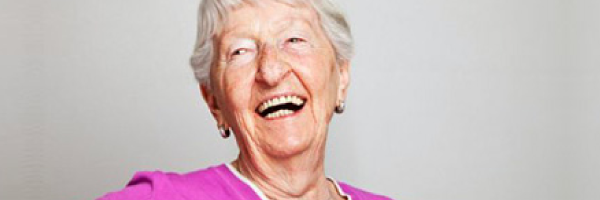Third Age's AgeWell Project
Posted on 24th May 2018
What does it take to develop a thoughtful and successful peer-led programme that promotes the well-being of older people living at home, and offers a timely intervention as required? AgeWell, being managed by Third Age in collaboration with the HSE, began taking the first careful steps in autumn 2017, and is now at an early implementation stage. Avril Hevey, Third Age, is the Programme Manager. “AgeWell is already working well in Co Limerick and we have received great support from them. Here in South Meath, in publicising the programme, recruiting AgeWell Companions and identifying older clients that would benefit, we worked closely with the HSE, GPs, Garda and other community personnel”, she says.
AgeWell Global began as a befriending project in South Africa. Its peer aspect - mothers supporting mothers - contributed greatly to its success. This philosophy continues in the Irish programme with trained AgeWell Companions fostering a relationship with their more vulnerable peers. Avril explains how the programme works: “Our Companions will take time getting to know the older people they visit at home. It’s about, building up a relationship of trust. The Companions will visit every week, and keep in touch by phone twice a week. On every second visit, they will use an App with a 20-question checklist to assess the health and wellbeing of the older person. The Companion will observe how the older person is, and determine if there have been any changes since last time. The phone app data is logged into a database giving an ongoing health profile of each person. All information is shared on a strictly confidential basis,” she says.
Any feedback raising concerns will trigger a professional response. This may involve a referral to or discussion with the HSE primary care team. “But it may not always need a referral. It could be our visiting the older person, and resolving minor issues before they escalate into bigger problems. It may involve talking to a family member, looking at other community services that could help,” says Avril. She is a qualified nurse with 20 years’ experience of older people. A baseline evaluation at the start of the programme has assessed the physical, emotional and social health and circumstances of each client. This will be followed by a mid-line assessment in about four month’s time, and another evaluation at the end of the nine-month pilot phase.
The AgeWell Companions were recruited in recent months. Third Age looked for people with good communication and empathy skills, who are warm and friendly, trustworthy and reliable, and with their own transport. What were the training aims? “First and foremost to give the AgeWell Companions an overview of what the programme entails, the need for it, a clear outline of the type of client they will meet. Our clients’ living choices may be different from our own, so it is important to broaden our horizons, to be non-judgemental and to give everyone the respect and dignity they deserve. We also aimed to have our AgeWell Companions familiar with the technical aspect of the programme. Some of them had never used a Smartphone before and we were now introducing them to an app. The purpose of the app is to ask questions that capture data that gives a voice to the older population in a comfortable and confidential manner. The technology made up about 50% of the training, including the monitoring and evaluation of the data collected,” she says.
The training covered communication, boundaries, issues of ageing, self-care for the Companions, as well as the technology. ““Communications included how we listen, our verbal and non-verbal skills. We looked at boundaries because it is important that both the client and the Companion know what they are expected to do, or not do,” says Avril. “For example, the Companion does not do household chores, or offer personal, or medical care to the people they are visiting. In training, we gave a lot of information on how the whole programme works, the support the Companions would have from us, and how to access that support. The AgeWell Companions ask the questions – ‘is the client able to get out this week, how are they eating’. The Companions observe. The app is very clever, the 20 questions are designed to capture data, including clusters so that anything picked up can trigger a referral if needed.”
What in training worked particularly well? “One of the things we hoped for was that the group would work well together and this happened beyond our wildest dreams. As the training went on, we had great craic, great bonding in the group, a lot of laughter, and this has continued in our weekly support meetings. I think the tone of course was right, and everyone found it very enjoyable. Discussing serious subjects, such as ageing, can be difficult, so it is important to keep the tone light at times. We paced the course carefully, we had lots of discussion, icebreakers. Having said that, this is a substantive course and we covered a lot of ground. Many of the participants found it very educational, both in its theoretical and technical aspects, and what they learnt about themselves,” she said.
Were there any surprises? “I think the modules on self-care were very important. These are people very anxious to give and make a difference. But it is important that they look after themselves. We gave inputs on how they seeking their own support, taking exercise, taking time for themselves, meditation, mindfulness, reflection. This was new to some people and they found it helpful.”
Nine Companions have now successfully completed training, have graduated with their Certificates, and are beginning to visit their clients and to get to know them. “Our clients vary greatly, from a variety of grounds, and there are varying degrees of social and physical challenges. We have people in their 70s, 80s and 90s, all living alone, some in towns, and many in remote rural areas. Many are lonely, either through their location, for social reasons or because they are frail and unable to get out”, says Avril The Companions continue to be supported by weekly meetings in Third. Age. These meetings will become even more useful as the programme continues and real client issues will be discussed. “In discussion, each client’s autonomy will be preserved in that we will be discussing the problems experienced by a particular client without naming them within the group. We feel the issue of rural isolation will present some particular problems, but also show the value of this programme,” says Avril.
“My hope would definitely be the AgeWell would improve and bring an enhancement to the lives of our clients, that it eases their level of loneliness and even of depression – if present - by making them feel they have the ear not only of their Companion but of the whole AgeWell team. My hope for the Companions is that they will get so much out of it, and will see and recognise the difference they are making,” she says.


